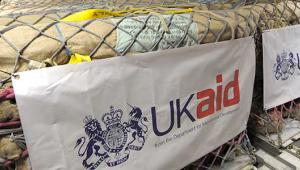The UK’s secretary of state for international development said in a speech last week that the British taxpayer should “get a good return on their generosity and compassion”, in a speech last week.
She proposed plans to allow private investors, such as pension funds and other for-profit groups, to put money into aid projects, which would be included in the UK’s commitment to spending 0.7% of national income on aid. The private companies would then get a return on their investments.
This would “make aid money work twice as hard”, she said.
Mordaunt suggested that the City of London puts some of its assets into development projects in poorer countries, where “even a small increase would have a huge impact”.
Redirecting 1% of assets to investment in Africa could generate an additional investment of around $110bn, she explained.
She added that redefining what counts as aid – so that it’s not just public funds - could contribute to “reducing the ask on the public purse” and mean that millions of pounds a year could be cut from the taxpayers’ overseas aid bill.
Mordaunt was speaking at the London offices of CDC, a body funded by the Department for International Development to invest in companies to boost jobs across Africa and South Asia.
“CDC is doing good while making money. It uses its expertise and capital to build stronger businesses that create jobs, generate taxes and develop new products and services,” she explained.
“Last year it made over £1bn of new investment commitments and backed businesses to directly employ 735,000 people.”
But under the OECD’s international rules on aid re-investment does not count towards the 0.7% commitment, which is enshrined in law in the UK.
Mordaunt will need to ask the OECD to alter its rules on what constitutes aid – currently defined as money from public finances.
She said: “I will continue to work with our partners at the OECD to make sure the aid rules incentivise private sector investment where it’s needed: this is the only way we are going to collectively deliver the financing necessary to meet the Global Goals.”
“We want to use our aid to mobilise the private investment needed to fill the financing gap needed to deliver the Global Goals, tackling the barriers that prevent more investment flowing into developing countries,” she said.
But aid experts have criticised the plans for focusing too much on profits rather than reducing poverty.
Jesse Griffiths, head of development strategy and finance at the Overseas Development Institute, told PF International this would be a concerning move.
He said: “It could skew incentives and damage impacts. Decisions about where to spend UK ODA should be based on achieving development outcomes, rather than making a profit on investments.”
He explained that the poorest countries are the ones that need the most help but they were also the hardest to make profits in.
“The world’s poorest already face a significant funding gap to enable them to provide basic services, such as health and education.
“They are also the countries where it is hardest to find profit-making opportunities, meaning counting profits as ODA could lead to less, rather than more aid going to these countries,” Griffiths added.
Judith Bodie, interim CEO Bond, the UK’s network of international NGOs, also said there should be a priority on poverty reduction over profit.
Mordaunt added that in order to achieve the UN Sustainable Development Goals, the private sector needs to help as the world is facing an annual $2.5 trillion financing gap.
She said: “We have tackled the dogma and culture that still exists in some parts of the aid sector, which not only sees organisations failing to put the beneficiaries first but also preventing the private sector from helping deliver those Global Goals.”
Last year, traditional donor governments gave around $150bn in aid, but the private sector is needed to do the rest, she said.






